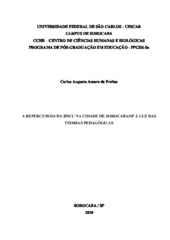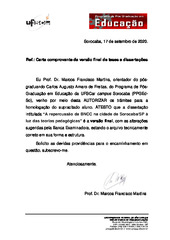| dc.contributor.author | Freitas, Carlos Augusto Amaro de | |
| dc.date.accessioned | 2020-09-25T13:04:09Z | |
| dc.date.available | 2020-09-25T13:04:09Z | |
| dc.date.issued | 2020-07-22 | |
| dc.identifier.citation | FREITAS, Carlos Augusto Amaro de. A repercussão da BNCC na cidade de Sorocaba /SP à luz das teorias pedagógicas. 2020. Dissertação (Mestrado em Educação) – Universidade Federal de São Carlos, Sorocaba, 2020. Disponível em: https://repositorio.ufscar.br/handle/ufscar/13286. | * |
| dc.identifier.uri | https://repositorio.ufscar.br/handle/ufscar/13286 | |
| dc.description.abstract | Abstract: the present work was developed under the methodological guidance of bibliographic, documentary and field research. Researching Brazilian education in times of change that guide its practice towards training people for the job market under the bias of a neo-technical education, the foundation of the common national curriculum base, was the research proposal, the specific focus was the municipality of Sorocaba / SP. The curriculum, in its historicity, and the BNCC were analyzed from the critical and non-critical pedagogical theories, to better understand the relationships behind the political, economic, cultural and social orientations that imposed the construction and approval of the national base. Despite its recent existence as a public policy for the implementation of a nationally guiding curriculum for education networks in Brazilian states and municipalities, we undertook a field survey to verify in loco, among professionals of the Sorocaba school space (managers, coordinators and teachers) , responsible for teaching in their formal curricular guidelines, as the base has been shaping the school in Sorocaba since its approval. Considering the short time since the base was approved, it was found to be insipid in its presence in the schools surveyed, including the lack of knowledge of BNCC as a curriculum advisor among the research subjects. We conclude that, in spite of the changes imposed on education, transforming it more and more into merchandise, there are perspectives and pedagogical orientations that face and keeps on the horizon the possibility of a transformative education that allows to increase the humanization potential of the people involved in the educational process, which proved to be forceful in the process of formulating the base, denouncing its real intentions. | por |
| dc.description.sponsorship | Não recebi financiamento | por |
| dc.language.iso | por | por |
| dc.publisher | Universidade Federal de São Carlos | por |
| dc.rights | Attribution-NonCommercial-NoDerivs 3.0 Brazil | * |
| dc.rights.uri | http://creativecommons.org/licenses/by-nc-nd/3.0/br/ | * |
| dc.subject | BNCC (Base nacional comum curricular) | por |
| dc.subject | Educação | por |
| dc.subject | Teorias pedagógicas | por |
| dc.subject | Sorocaba/SP | por |
| dc.subject | Currículo | por |
| dc.subject | BNCC (National Common Curricular Base) | por |
| dc.subject | Education | por |
| dc.subject | Pedagogical theories | por |
| dc.subject | Sorocaba / SP | por |
| dc.subject | Curriculum. | por |
| dc.title | A repercussão da BNCC na cidade de Sorocaba /SP à luz das teorias pedagógicas | por |
| dc.title.alternative | The repercussion of BNCC in the city of Sorocaba / SP in the light of pedagogical theories | por |
| dc.type | Dissertação | por |
| dc.contributor.advisor1 | Martins, Marcos Francisco | |
| dc.contributor.advisor1Lattes | http://lattes.cnpq.br/4515924584428591 | por |
| dc.description.resumo | Resumo: o presente trabalho foi desenvolvido sob a orientação metodológica da pesquisa bibliográfica, documental e de campo. Pesquisar a educação brasileira em tempos de mudanças que orientam sua prática para a formação de pessoas para o mercado de trabalho sob o viés de uma educação produtivista, alicerce da base nacional comum curricular, foi a proposta da pesquisa, o recorte específico foi o município de Sorocaba/SP. O currículo, em sua historicidade, e a BNCC foram analisados a partir das teorias pedagógicas críticas e não críticas, para melhor compreender as relações por detrás das orientações políticas, econômicas, culturais e sociais que impuseram a construção e homologação da base nacional. Apesar de sua recente existência como política pública para efetivação de um currículo nacionalmente norteador das redes de ensino em estados e municípios brasileiros, empreendemos uma pesquisa de campo para verificar in loco, entre os profissionais do espaço escolar de Sorocaba (gestores, coordenadores e professores), responsáveis pelo fazer pedagógico em suas orientações curriculares formais, como a base está moldando a escola em Sorocaba desde sua homologação. Considerando o pouco tempo da aprovação da base, verificou-se ser insípida sua presença nas escolas pesquisadas, inclusive foi observado entre os sujeitos da pesquisa desconhecimento da BNCC como orientadora do currículo. Concluímos que, apesar das mudanças impostas à educação, transformando-a cada vez mais em mercadoria, existem perspectivas e orientações pedagógicas que fazem o enfrentamento e mantém no horizonte a possibilidade de uma educação transformadora e que possibilite elevar as potencialidades de humanização das pessoas envolvidas no processo educativo, que se mostraram contundentes no processo de formulação da base, denunciando suas reais intenções. | por |
| dc.publisher.initials | UFSCar | por |
| dc.publisher.program | Programa de Pós-Graduação em Educação - PPGEd-So | por |
| dc.subject.cnpq | CIENCIAS HUMANAS::EDUCACAO::CURRICULO | por |
| dc.subject.cnpq | CIENCIAS HUMANAS::EDUCACAO::FUNDAMENTOS DA EDUCACAO | por |
| dc.publisher.address | Câmpus Sorocaba | por |
| dc.contributor.authorlattes | http://lattes.cnpq.br/8839910228731153 | por |


